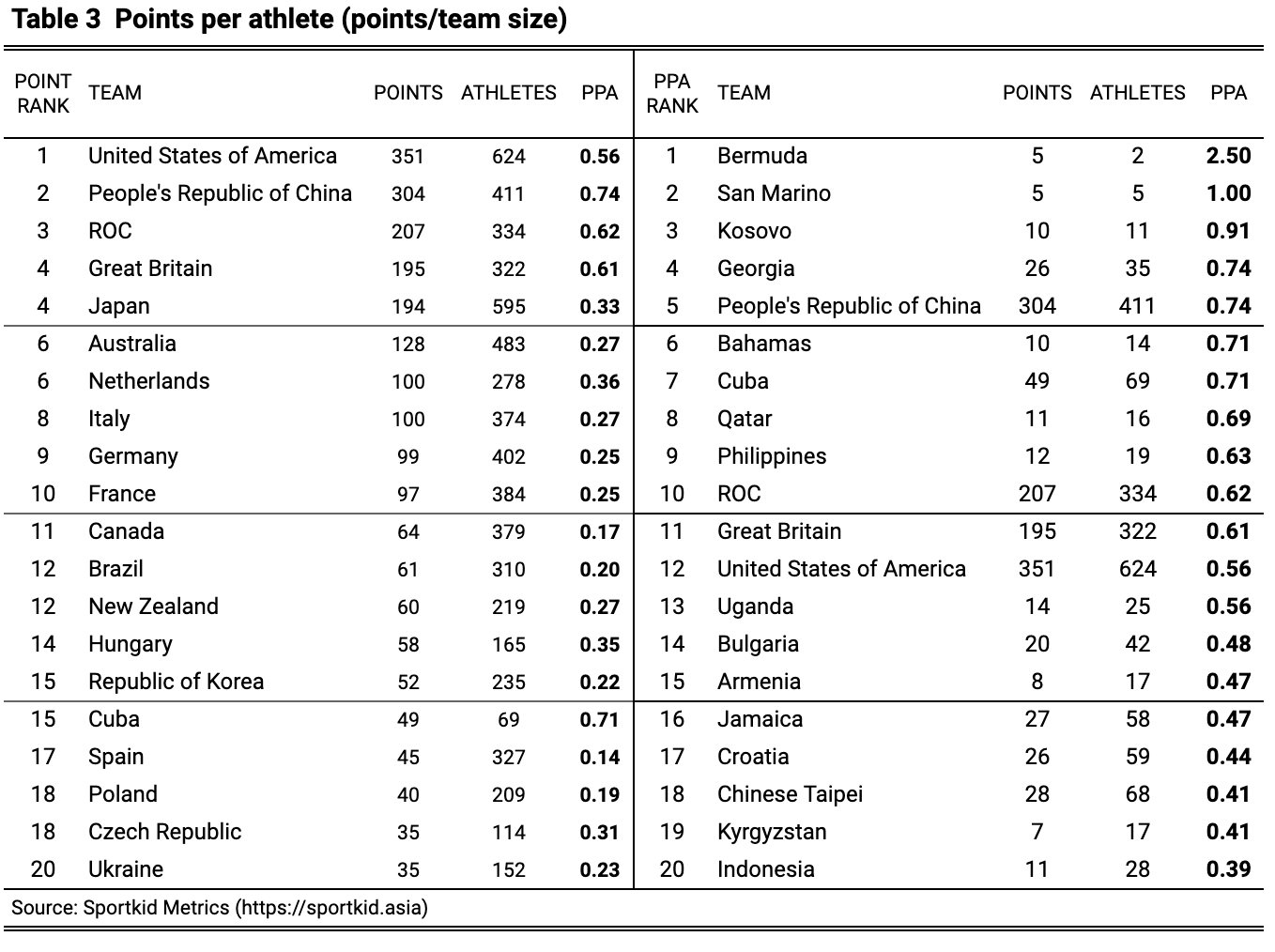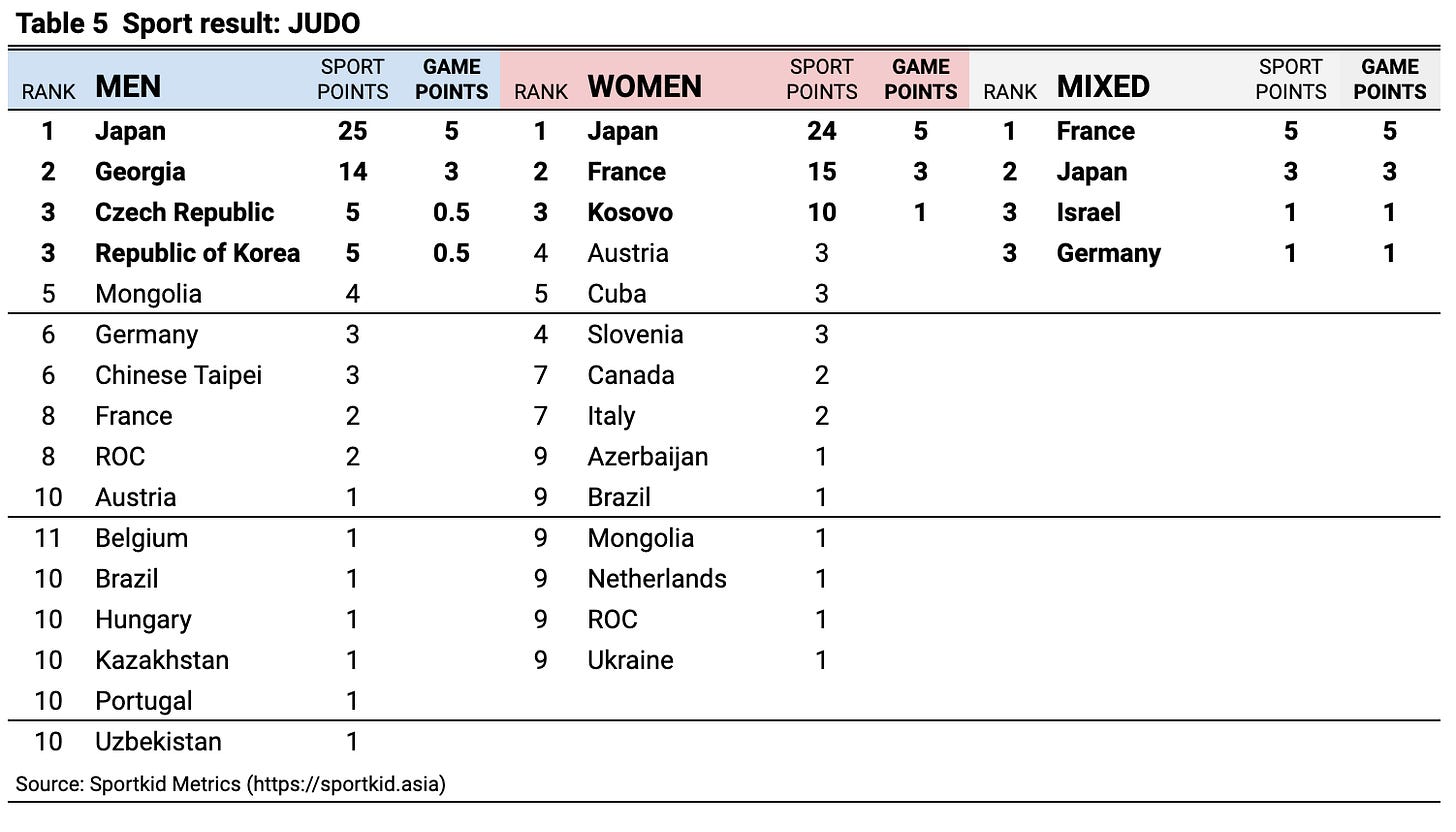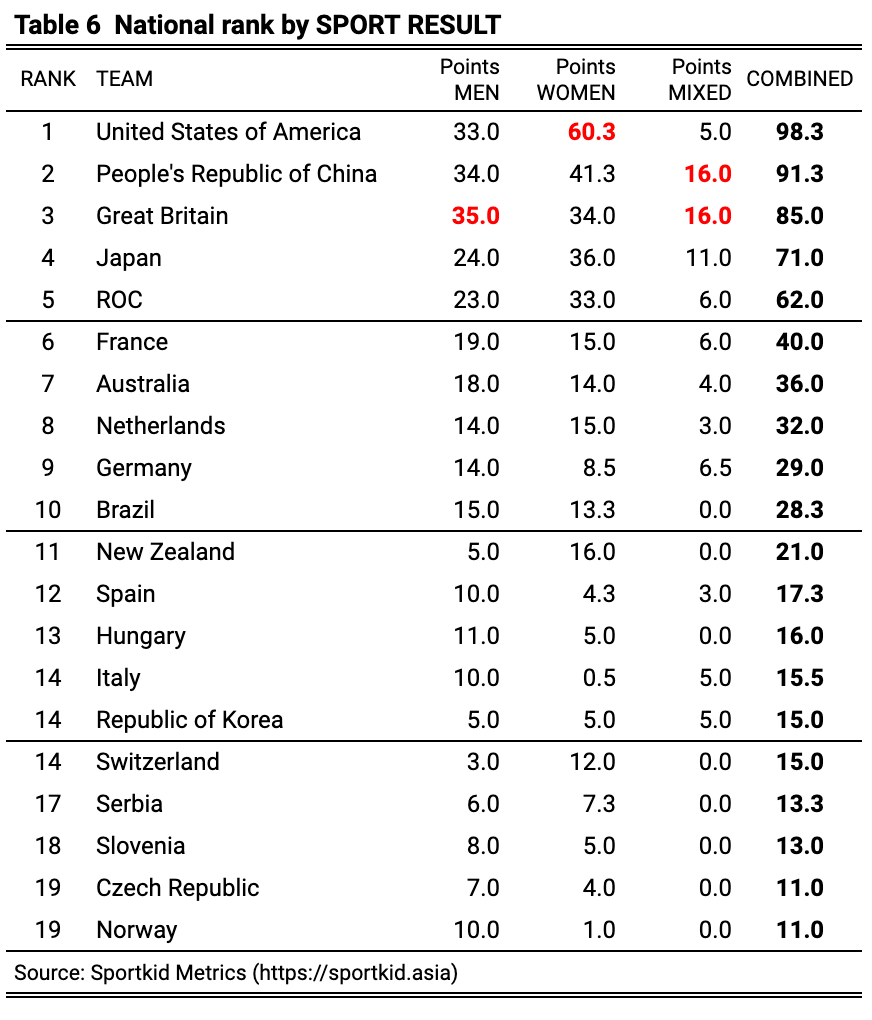Tokyo 2021: Who won?
The Games are much more than a simple medal count. A sensible scoring system could add a new layer of excitement to the quadrennial spectacle. In this article I propose a framework for such a system.
No country actually wins the Olympics. Even though the media rehashes the medal count everyday, the Games are not officially scored. This is true of all multi-sport events, Pan American Games, Asian Games, etc., no country walks away with the gold, so to speak. However, and precisely because there is no official method for determining an overall winner, the public and media long ago settled on the gold medal count as the de facto standard for declaring victory. While this is an easy way to measure success it's certainly not the best way.
In this letter I suggest two ways to evaluate performance in multi-sport events:
Use a point system for each medal. I have discussed this idea in previous articles. In keeping with the gold, silver, and bronze framework I suggest a 5-3-1 point structure.
Scoring each sport separately—as a separate tournament within the multi-sport Games—and then total the sport results to determine a Games winner.
Changes resulting from either of these ideas are administrative and occur in the background. Neither method requires any changes to how the current Games are conducted.
Related articles
The gold standard
First, let's review what the Tokyo medal count looks like. Table 1 shows the Top 20 teams from Tokyo based on their total gold medal count. This is what is unofficially used to gauge national performance in the Olympics. It's all over the media during the Games and it's presented as the final result for the 2020 Tokyo games.
There were 205 countries and a refugee team that participated in Tokyo. Of the 93 countries that won medals, 65 of them took home at least one of the 340 gold medals offered. Most of the 33 sports (46 disciplines) were contested in a men's and women's category. Two sports, artistic swimming and rhythmic gymnastics, were for women only and equestrian conducted a mixed-only competition. Eleven other sports offered a limited number of mixed events in addition to the sport's traditional men's and women's categories.
The Olympic Games is a variety show of sports and gold medals don't tell the full story. They don't reveal the strength of teams participating in a contest, nor does the gold tally reveal anything about the Games as a competition all by itself.
Additionally, there is a huge difference in how medals are distributed. Team sports usually offer just two medals, men's and women's, while individual sports are able to offer a number of different events, thus a larger number of medals.
Of course, these differences are due to the nature of team and individual sports but it's hard to understand why football, a sport played enthusiastically by countries around the globe, earns only one medal while much less popular or expensive sports can offer more—in some cases many more. In athletics, for example, 48 medals are contested with an odd 49th thrown in for a mixed relay
The almost exclusive emphasis on gold medals originates with the media and is mostly unquestioned by quadrennial, media-created fans. Devising ways to recognize the value of silver and bronze medals is an exercise for insiders who realize that the true scope of performance within the Games is lost when only gold medals seem important.
Value each medal by using points
In Table 2 a point system has been applied to each medal: Five points for gold medals, three for silver, and one for bronze. Using points the ROC and Japan flip their Table 1 positions; Ukraine and Spain are now in the Top 20; a few others shift slightly; Norway and Kenya are out.
The point system makes it possible to calculate a points-per-athlete (PPA) metric relative to team size, or as in Table 2, relative to the number of men and women a country entered. A combined PPA appears in Table 3.
Table 4 expands the PPA idea and applies it to a country's population for calculating a points-per-million (PPM) metric. This tends to favor smaller countries but I have a hunch that it may also be telling us something about sport capitalization but I don't know what this is...yet. Note that Table 4 is limited to countries with populations over 1 million.
A better way: Score the sports, not the medals
While the point system recognizes value in each medal it obscures sport specific information in the same way the gold medal standard does; the Games remain a mostly individual showcase. There is a better way to treat the Olympic Games as the multi-sport event that it is; score each sport separately, awarding points for first, second, and third place in each sport tournament; and then adding those points—game points—to get a Games winner.
The judo example in Table 5 shows how this works. Countries are ranked according to the points they score within the competition using the 5-3-1 system based on medals won in the 15 events contested in the judo tournament. These are called 'sport points' in the table and are used to determine the outcome of the judo tournament itself. The top three countries (or in the judo example the top four, due to a tie on the men's side) are then awarded game points, which go toward their overall score in the Games. This is done in all three categories: Men, Women, and Mixed if it exists. In judo, Japan won both the men's and women's categories and received 5 game points for each, and 3 game points for their second place finish in the mixed category for a total of 13 points from the judo competition. Only the top three countries in each sport receive game points toward their Games score.
Table 6 shows what the Tokyo result would look like if this sport scoring system were used. In Tokyo Great Britain won the men's competition and the United States won the women's and the combined competitions.
These changes would only add an administrative component to the results, so for the spectator everything would remain exactly as it is now. An official scoring system could create an extra layer of interest and drama, thus focusing on how each sport's result impacts the overall standings. Most importantly a scoring system would recognize the value of each medal, something that is not done now.










Interesting Bill